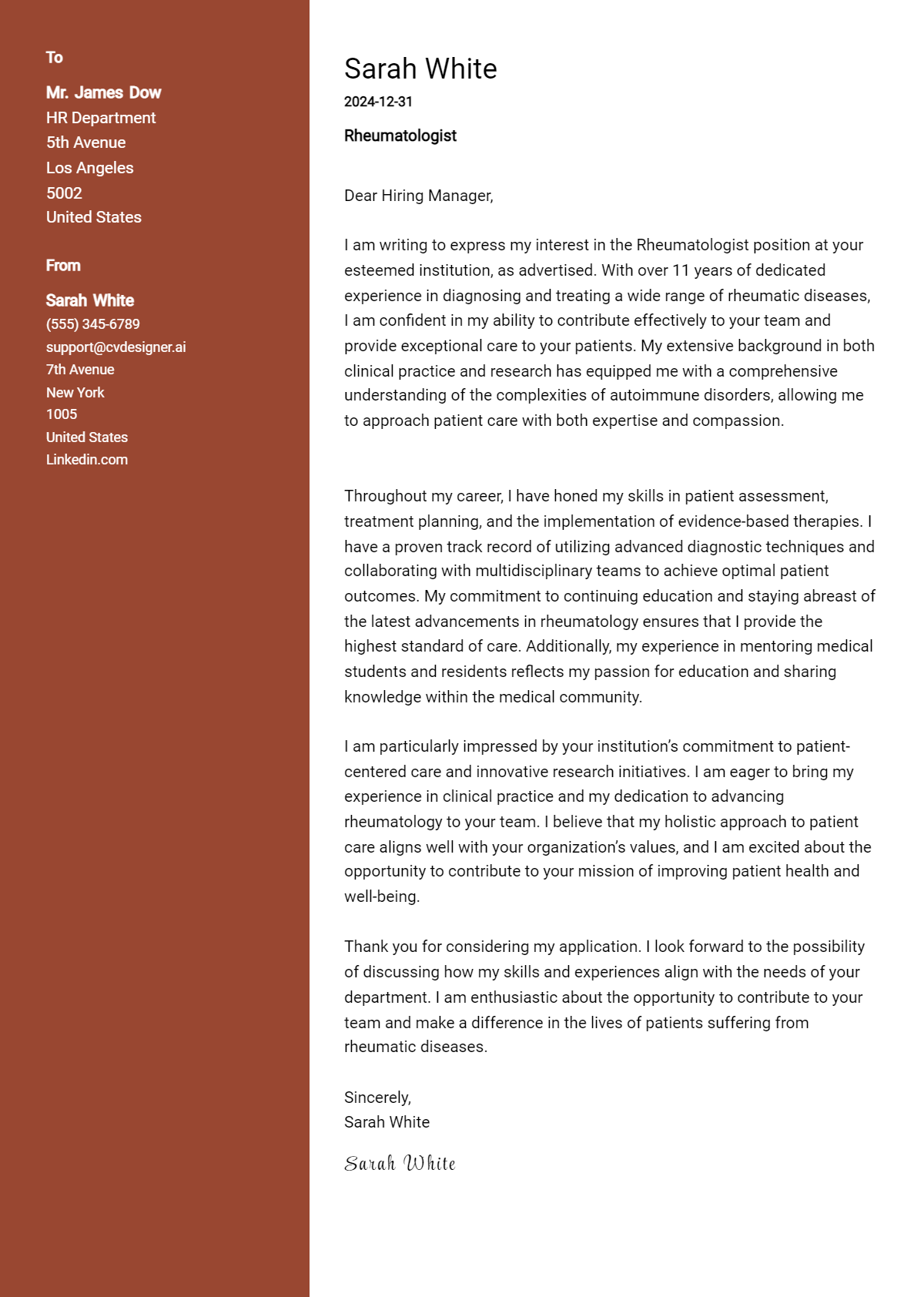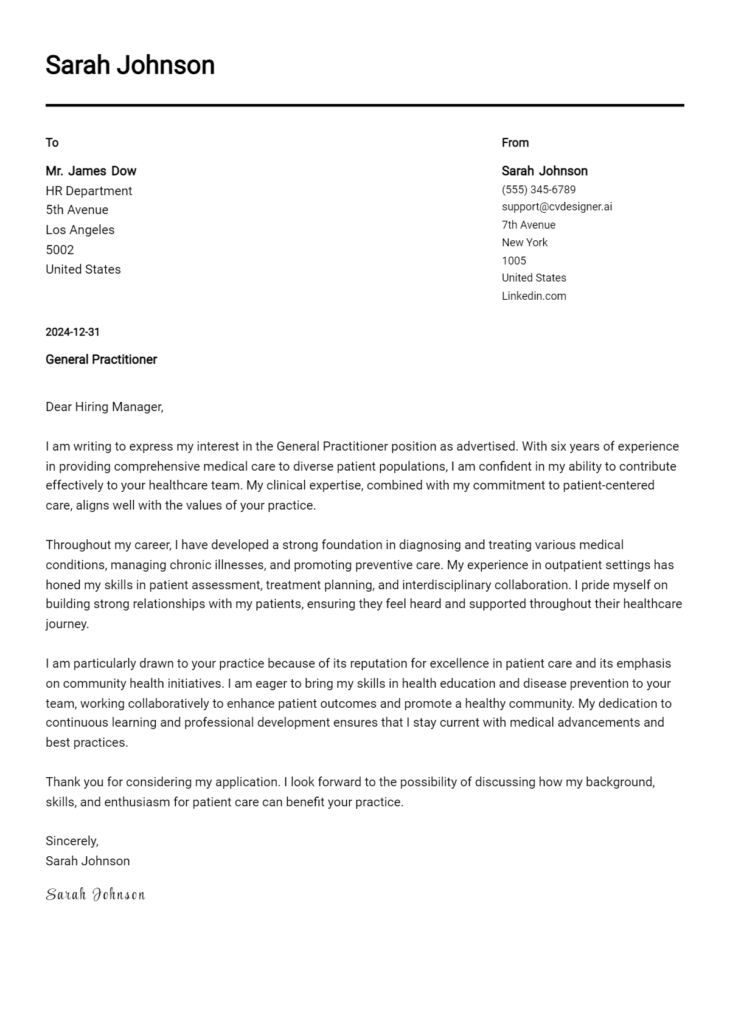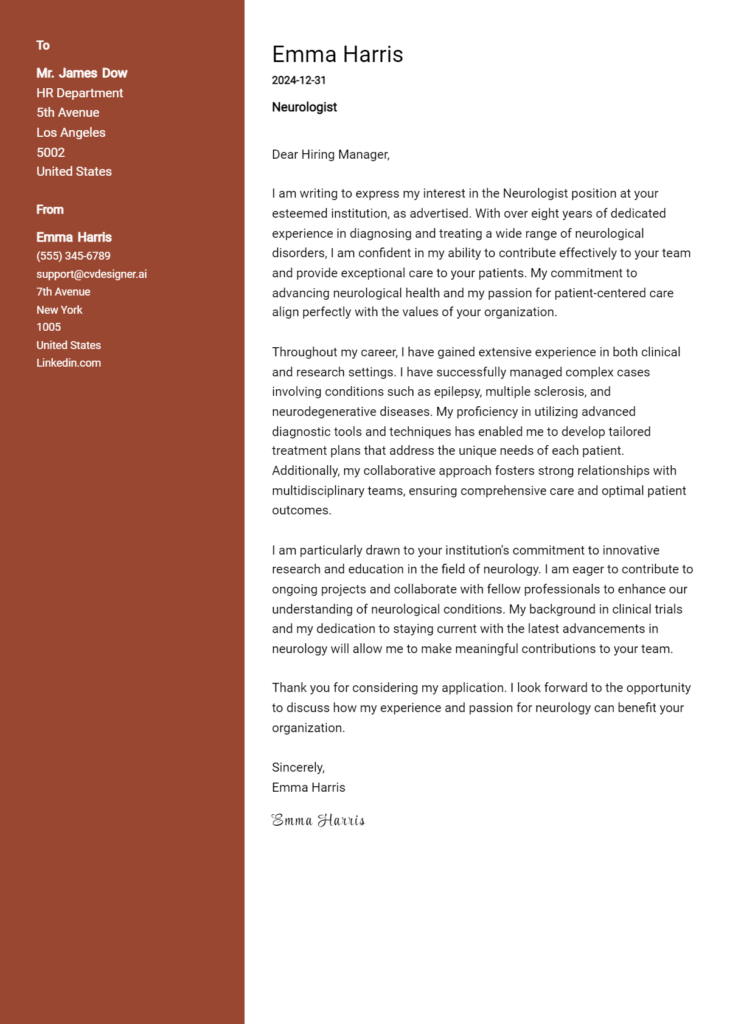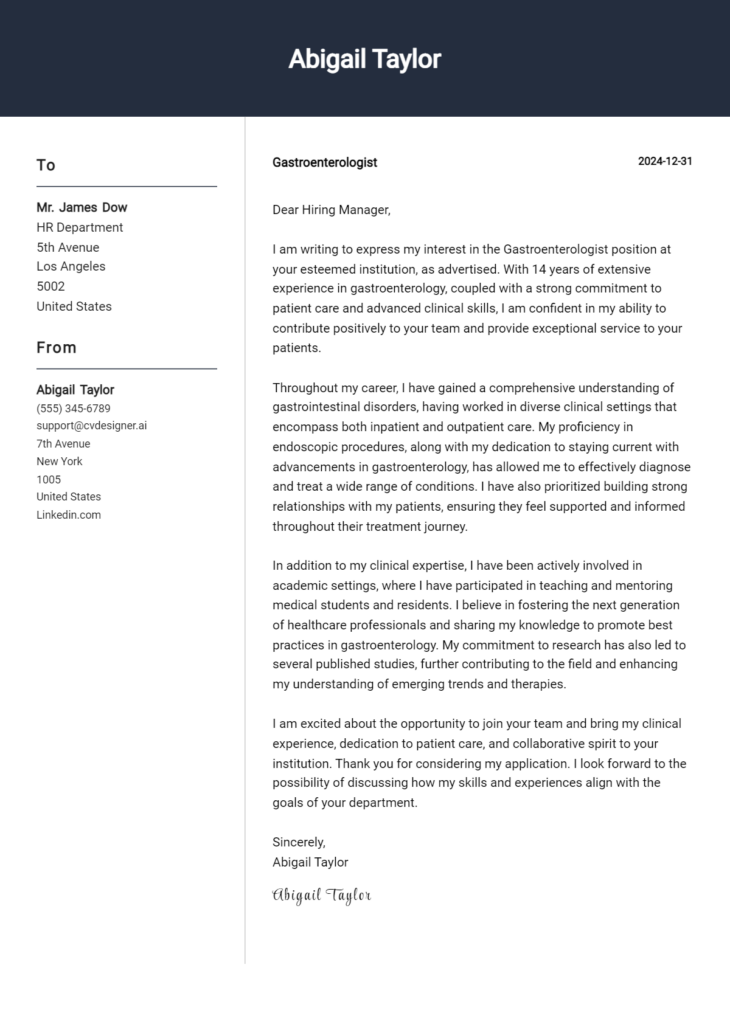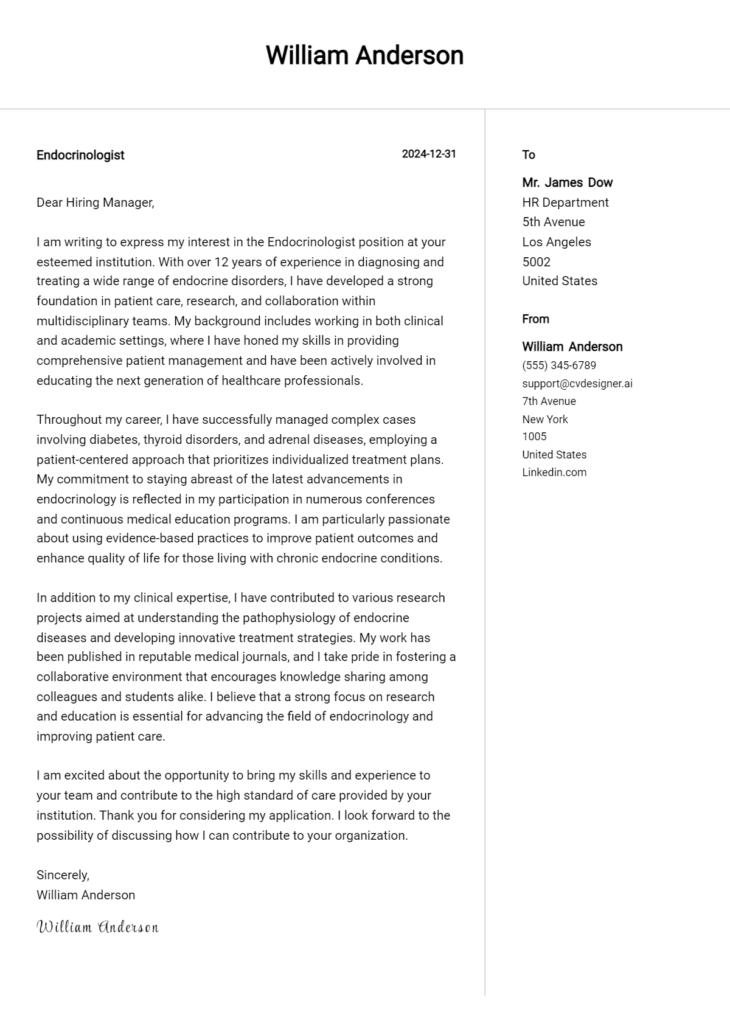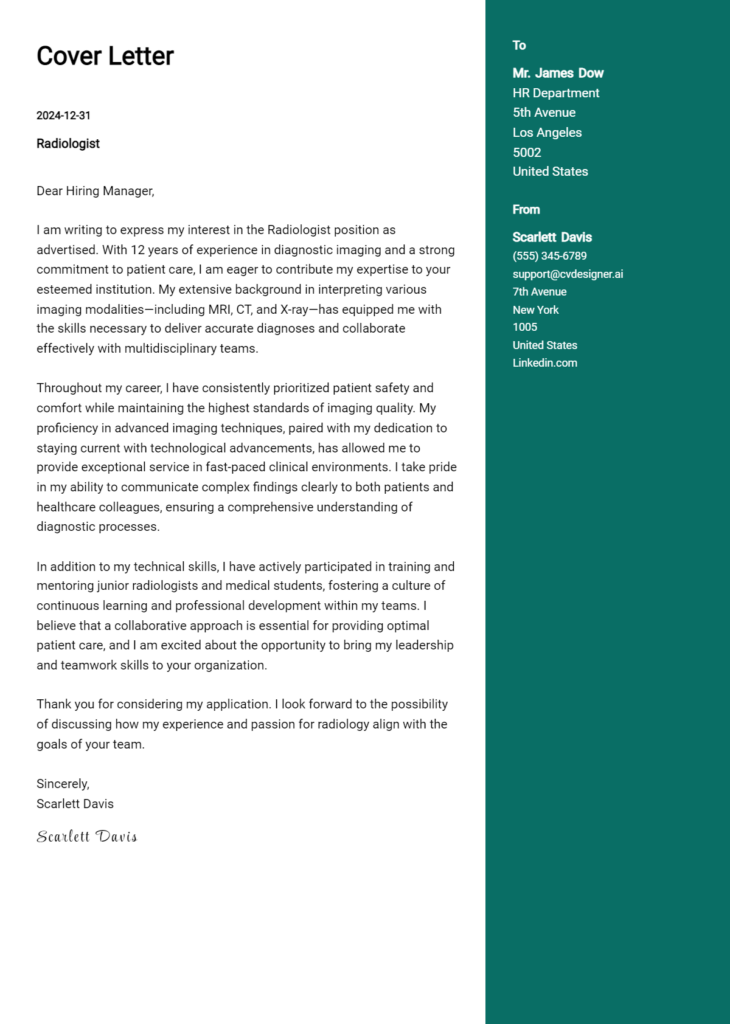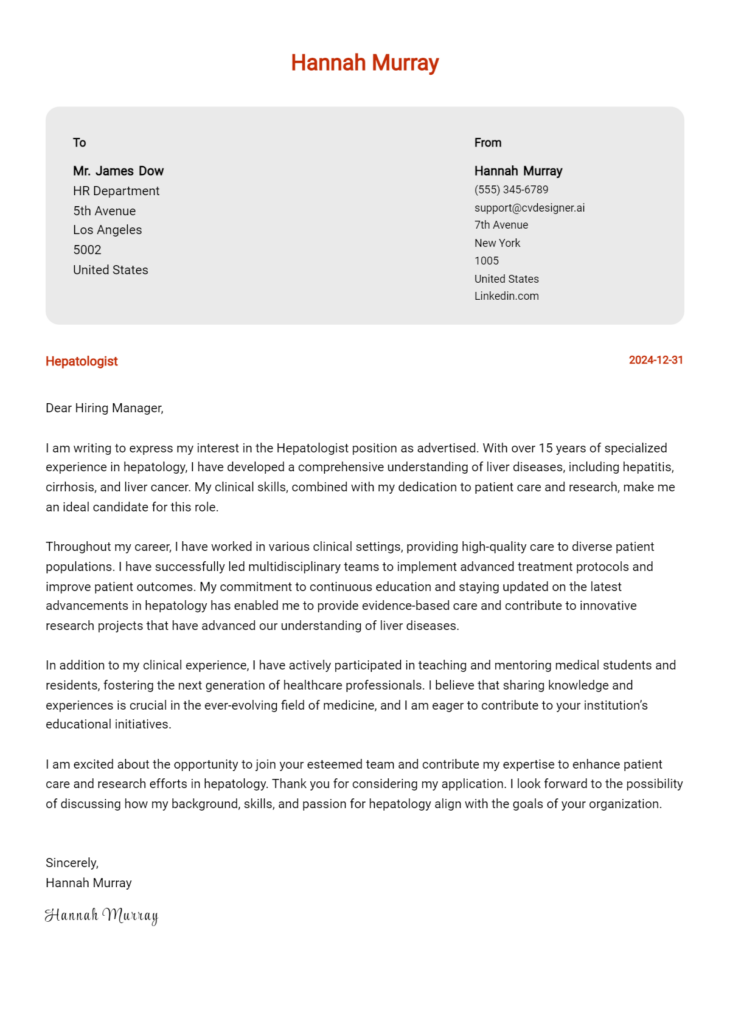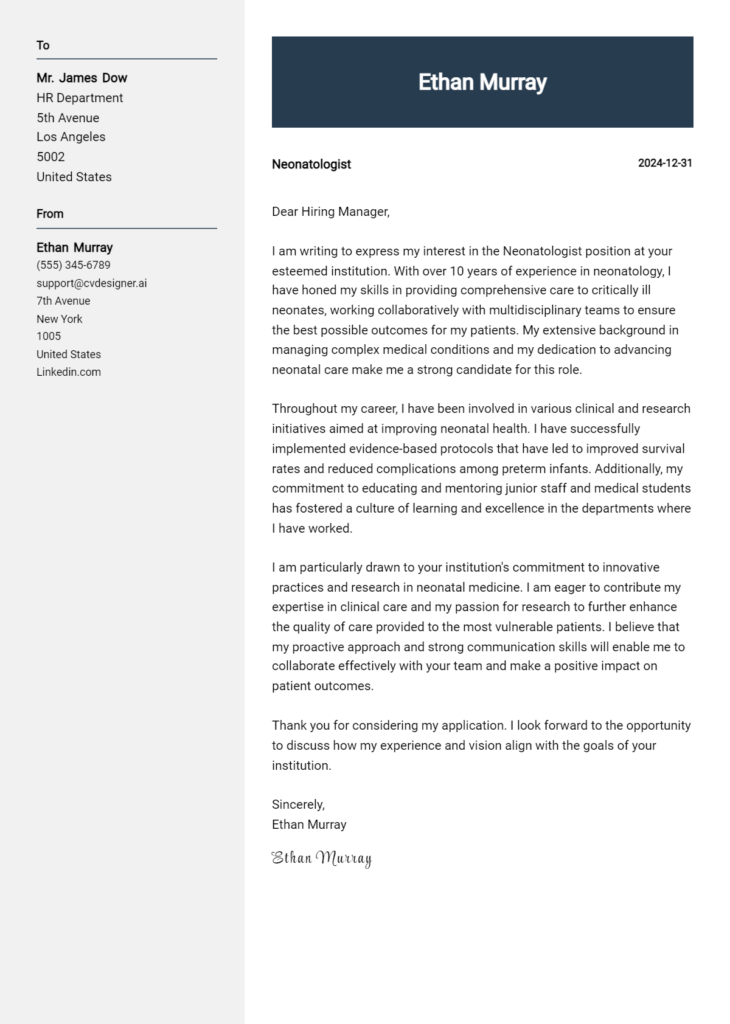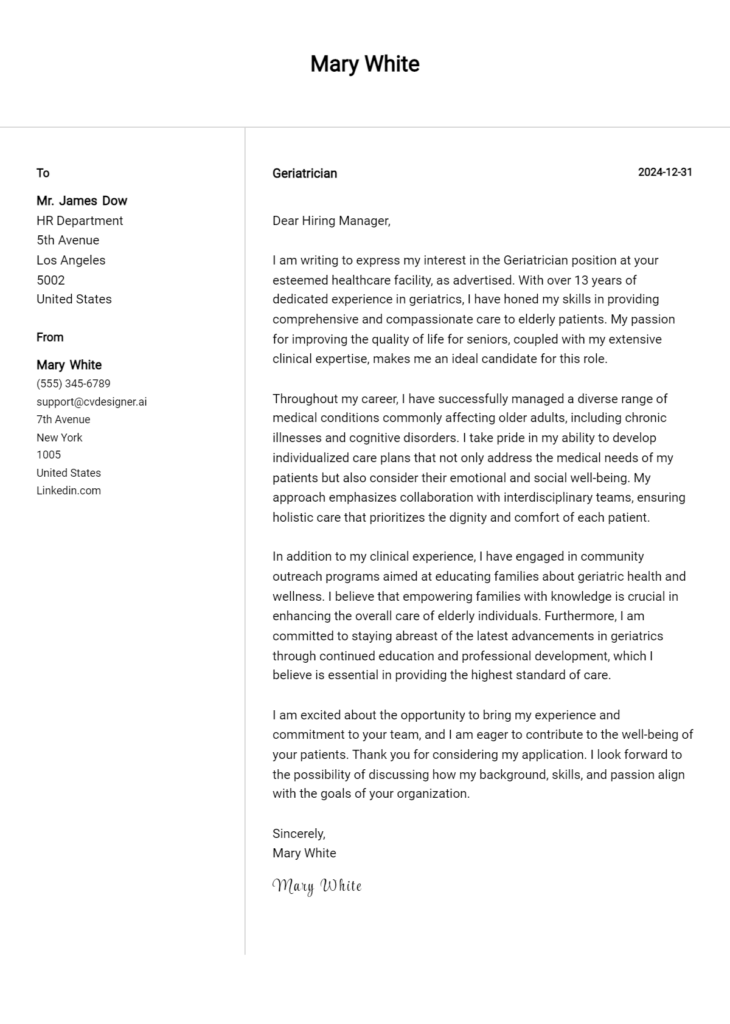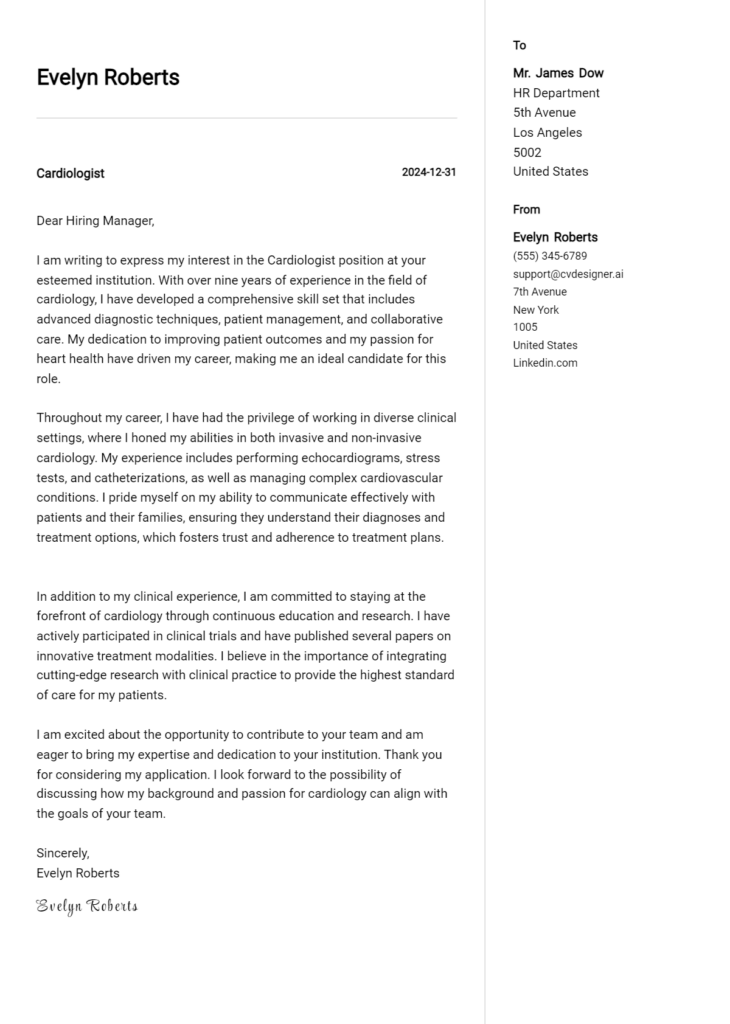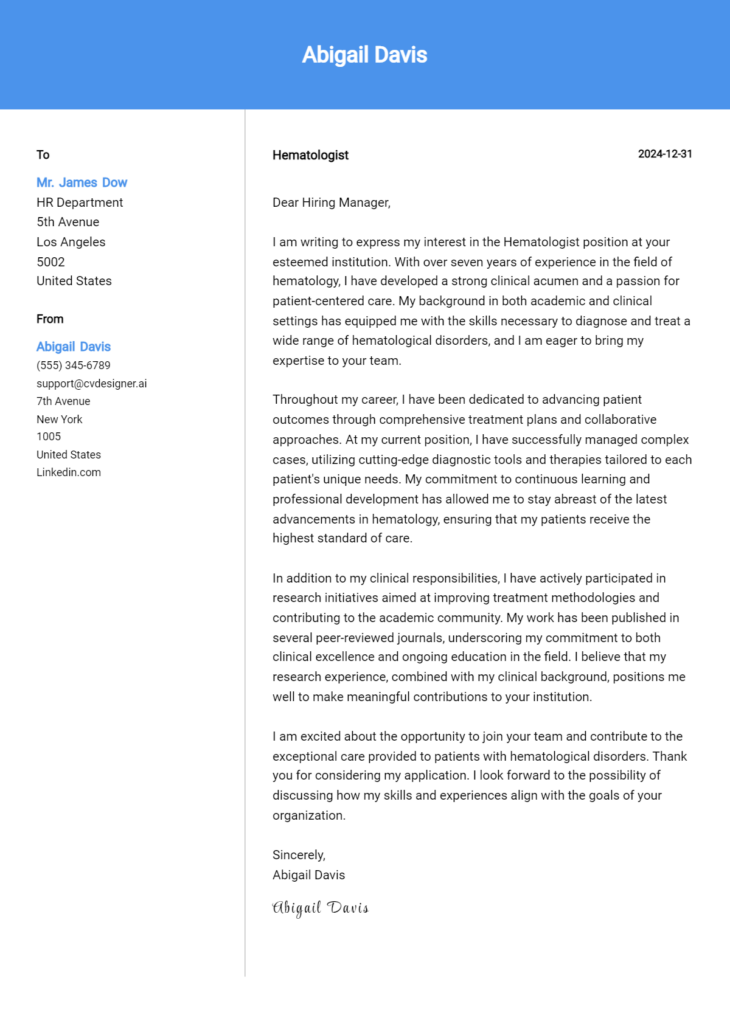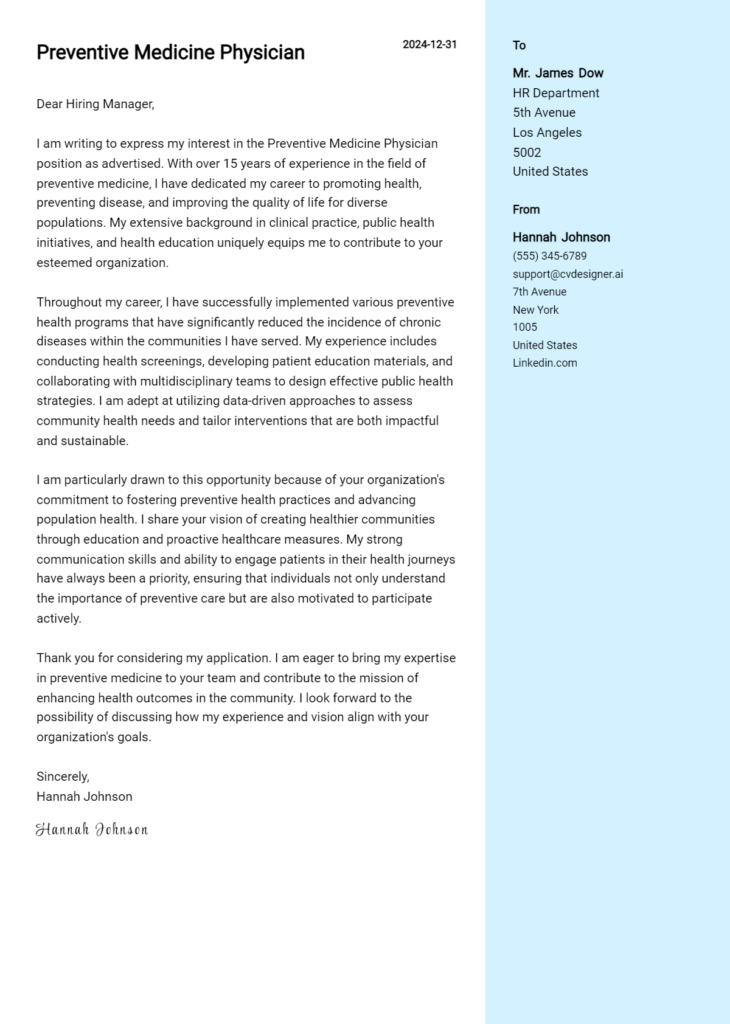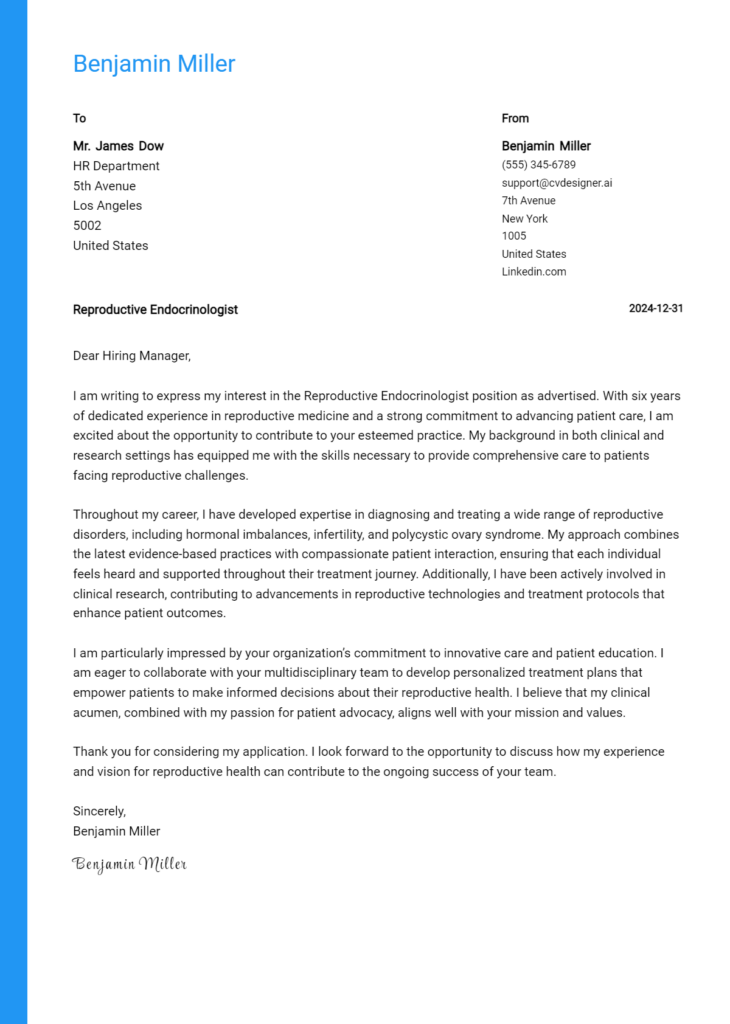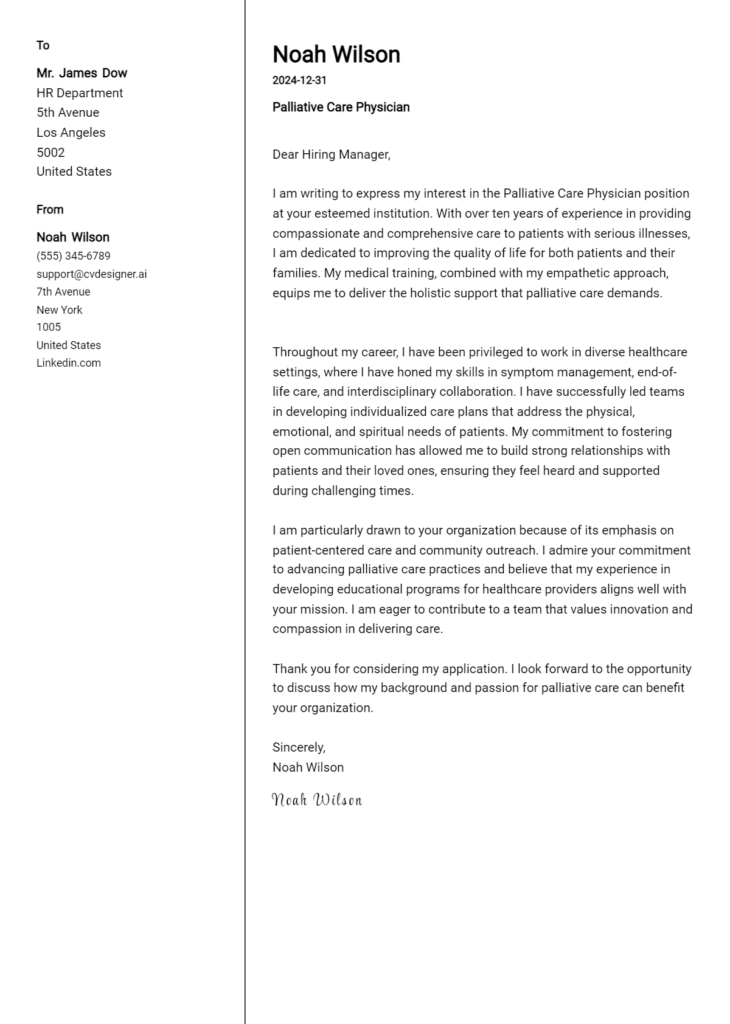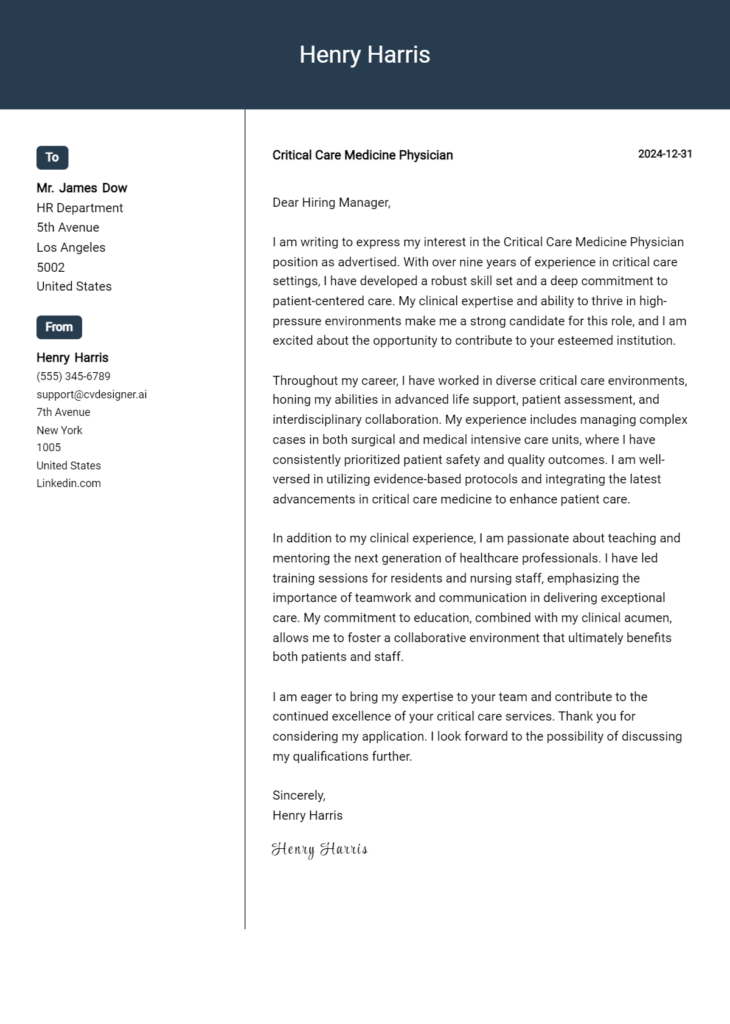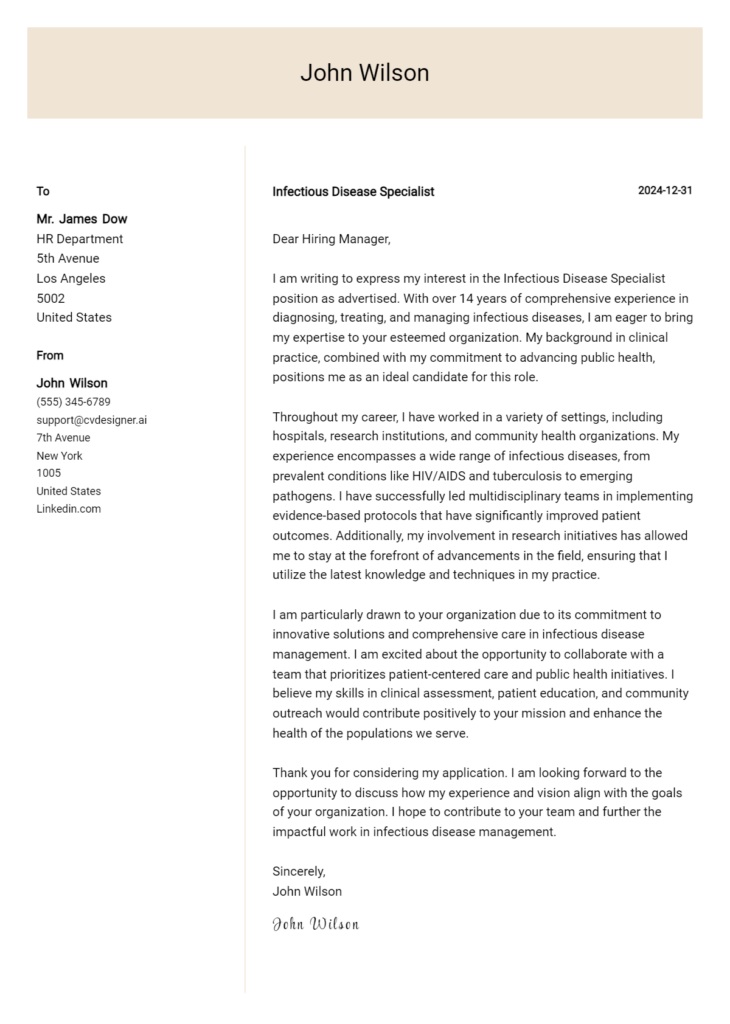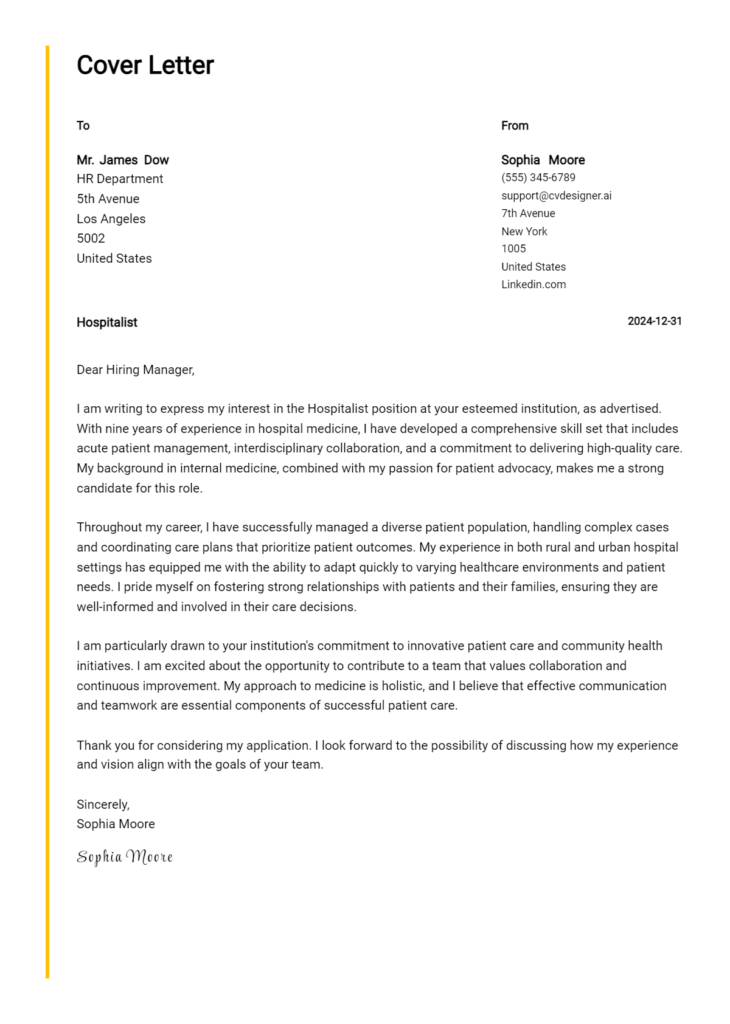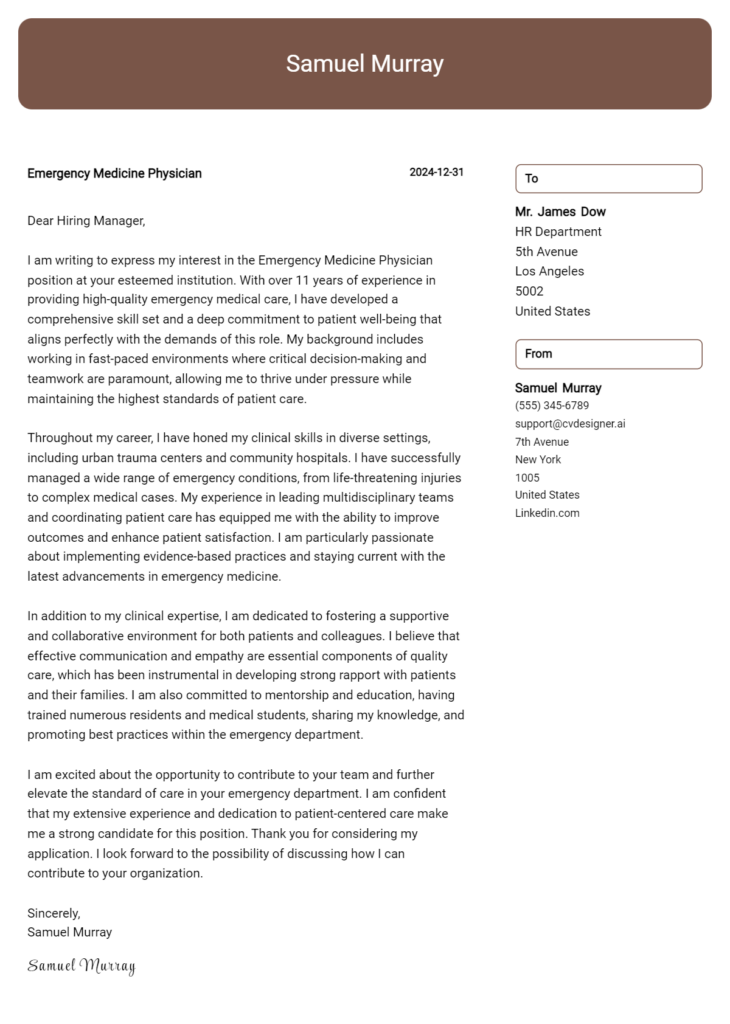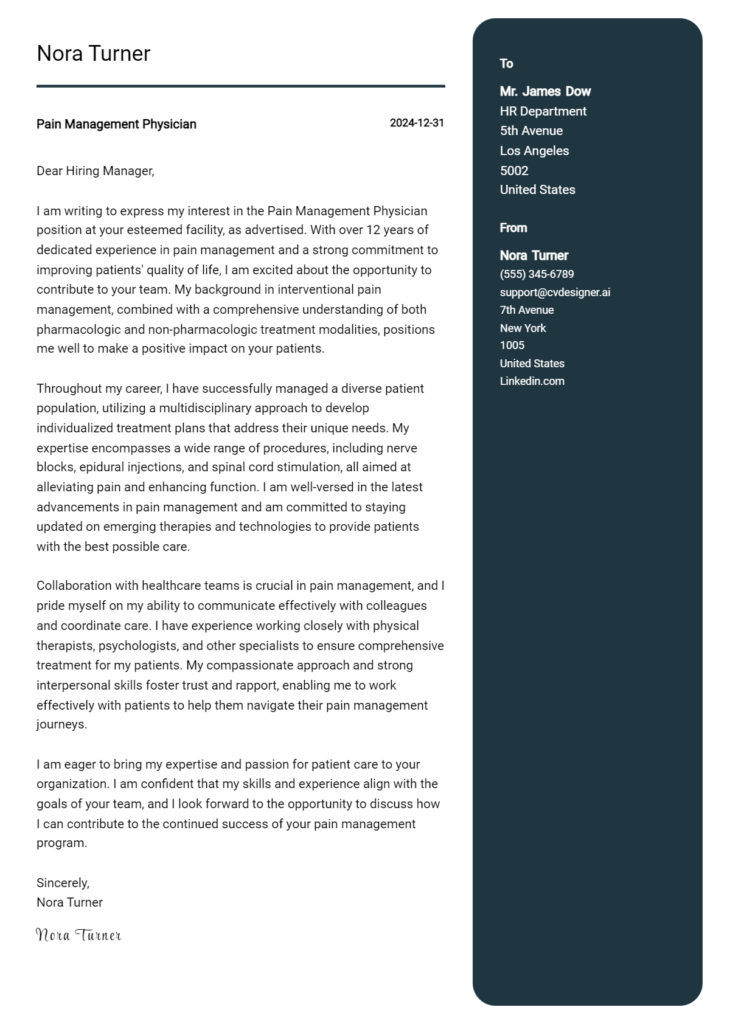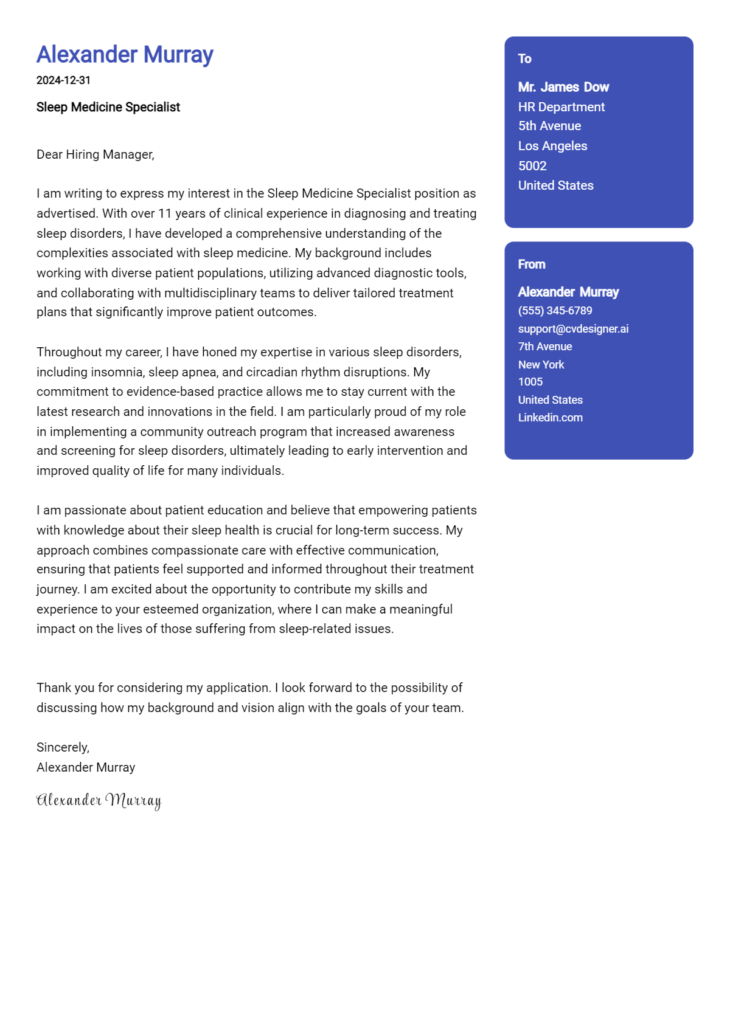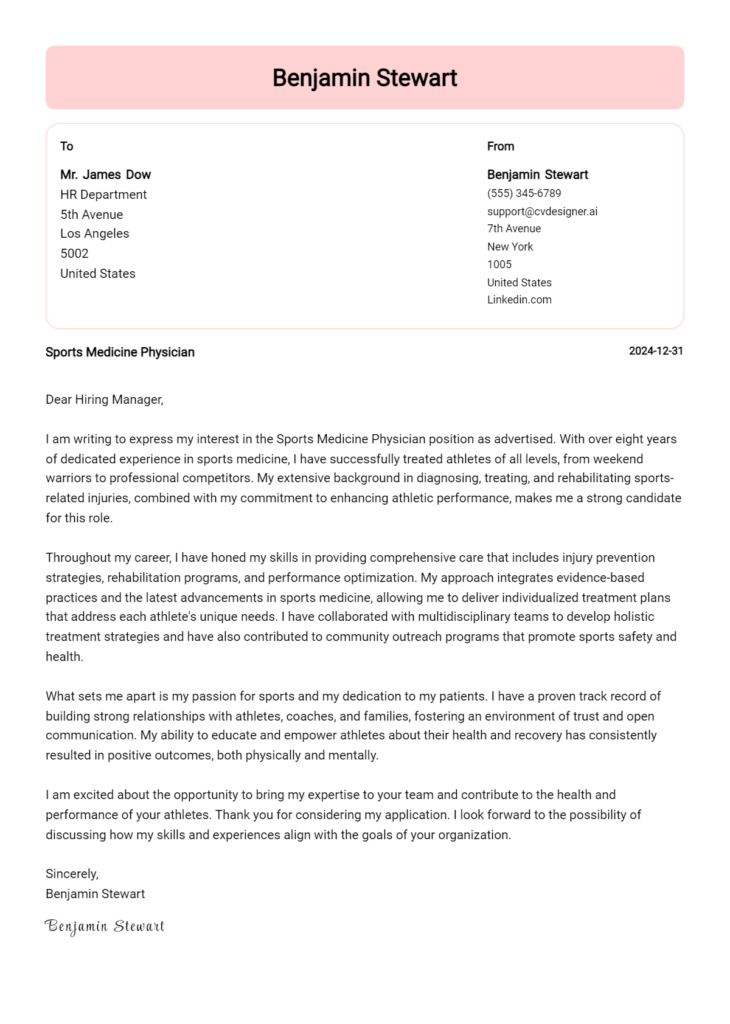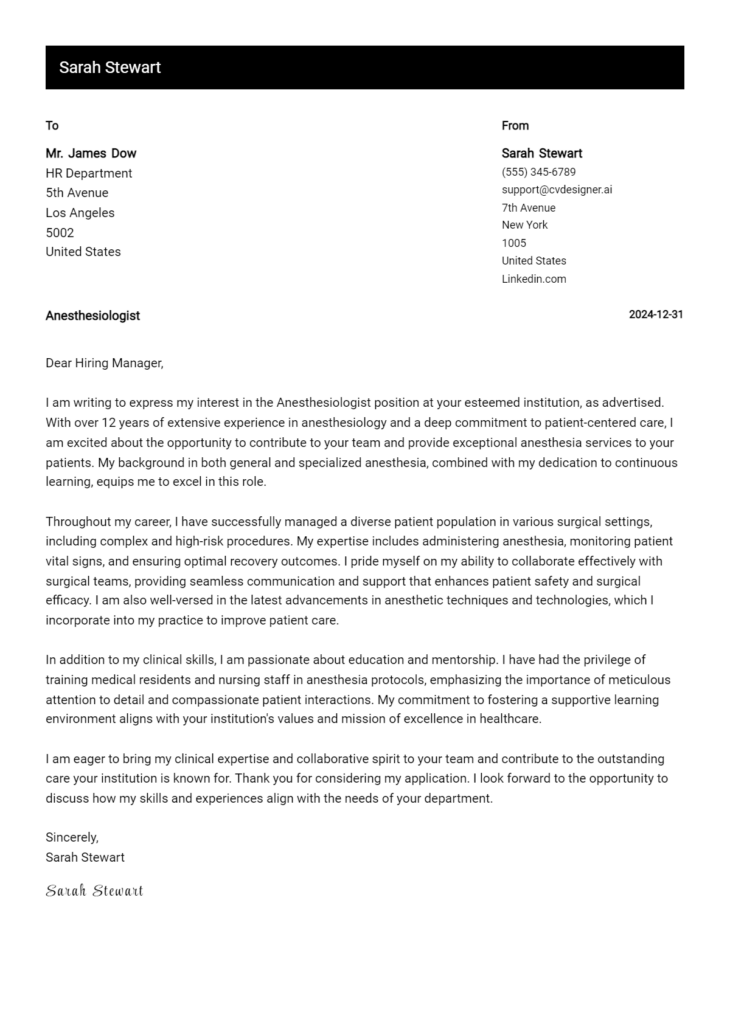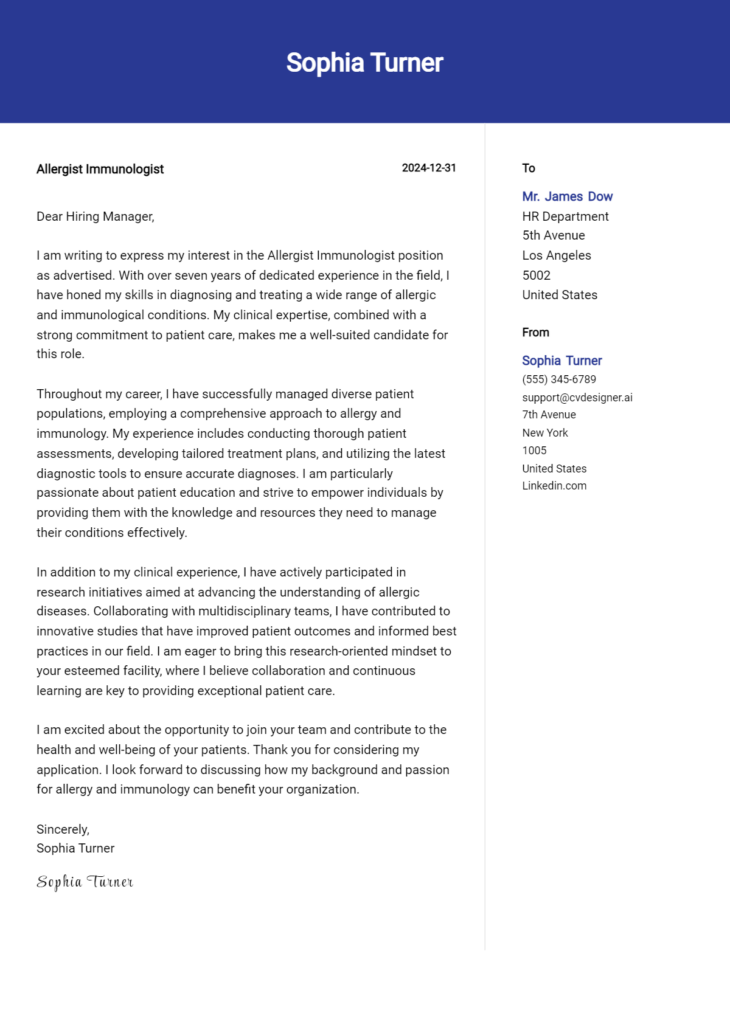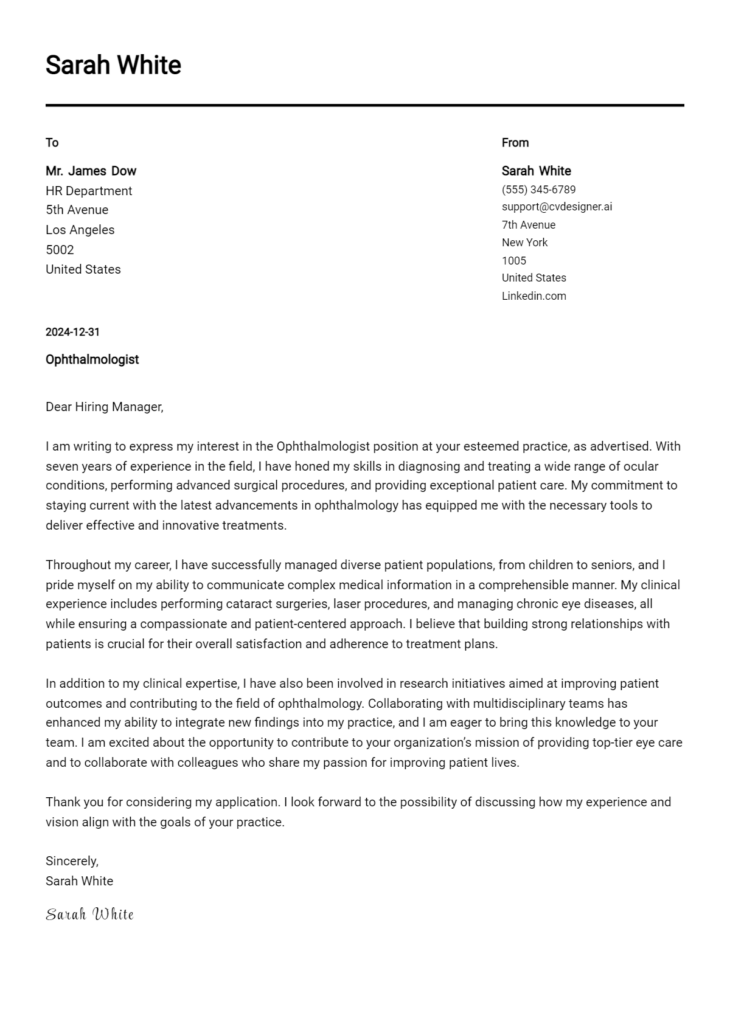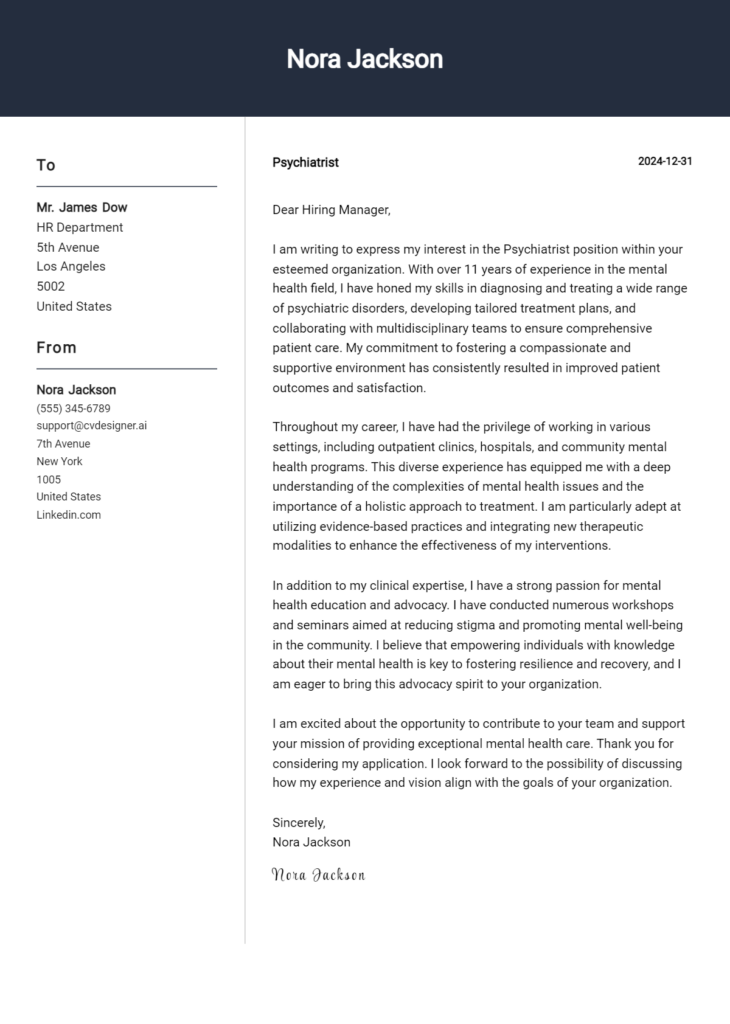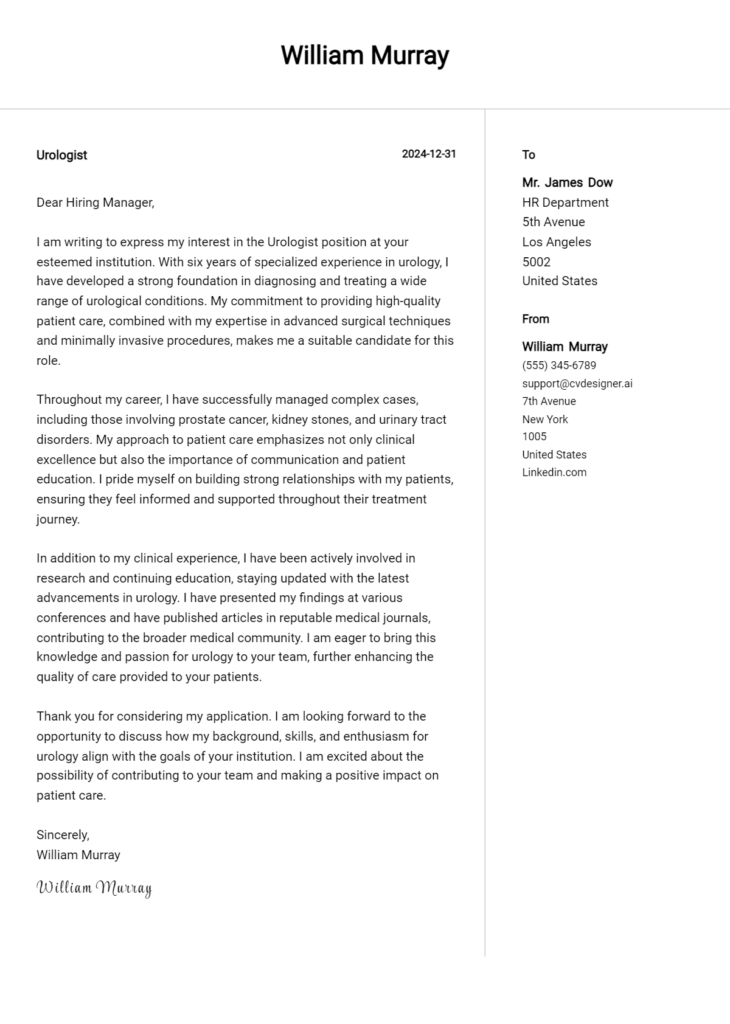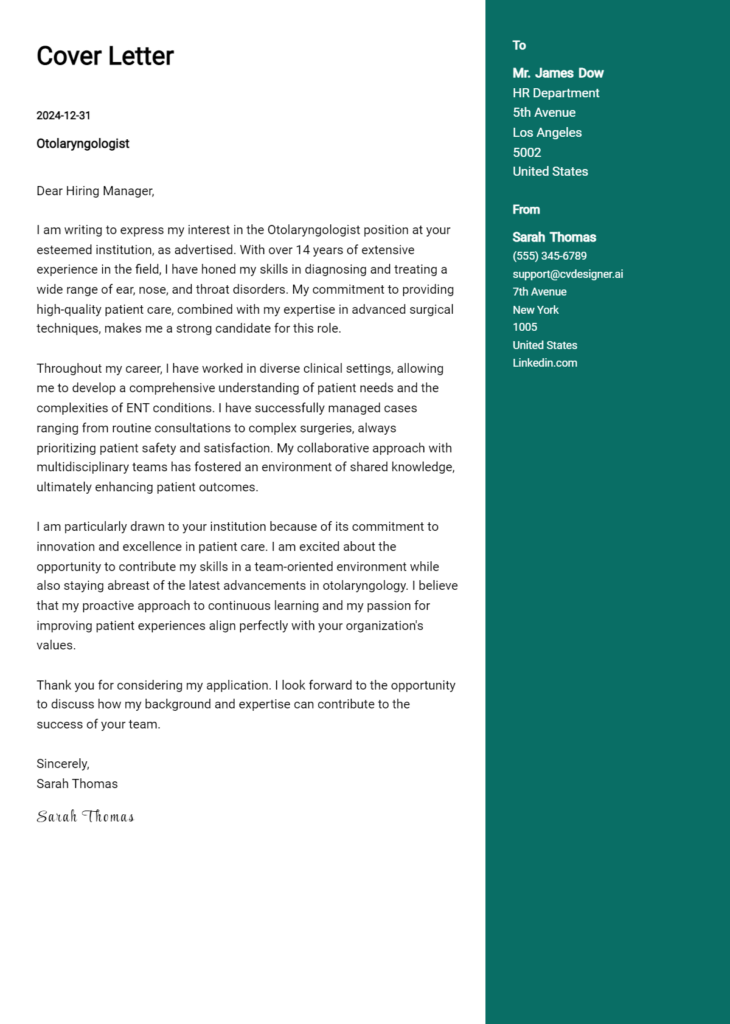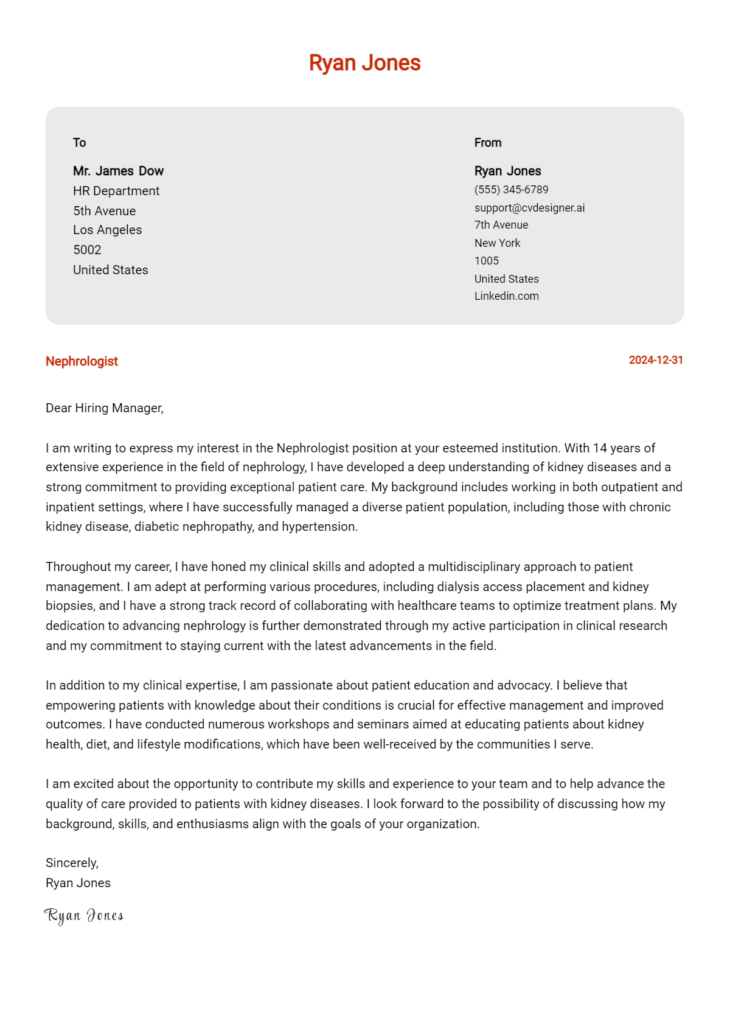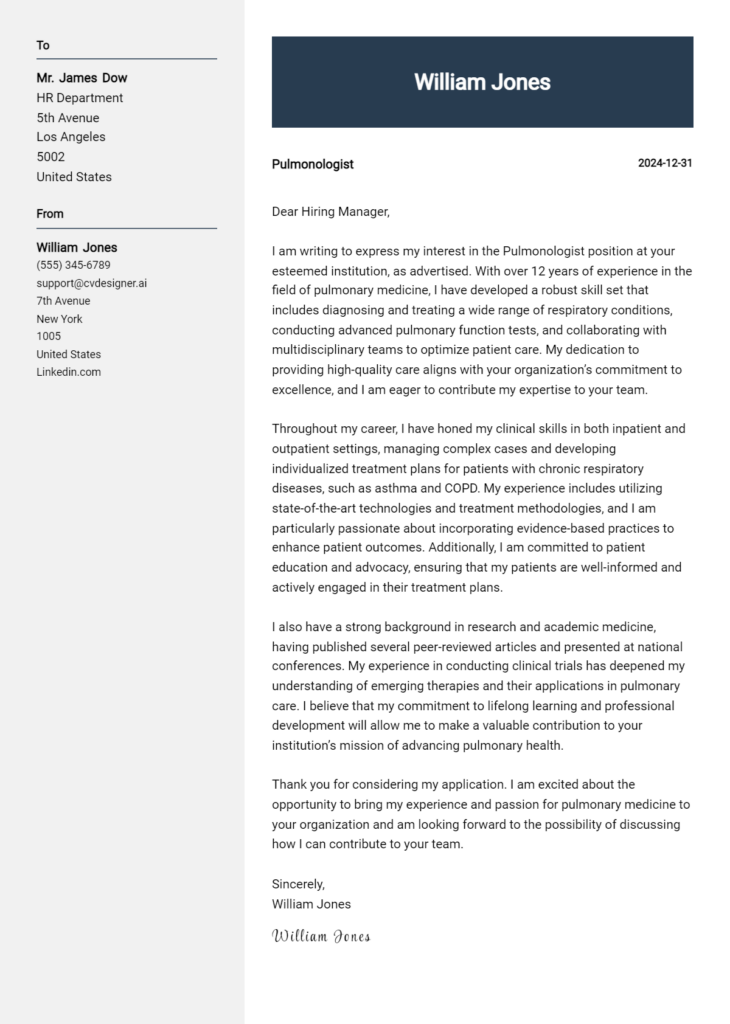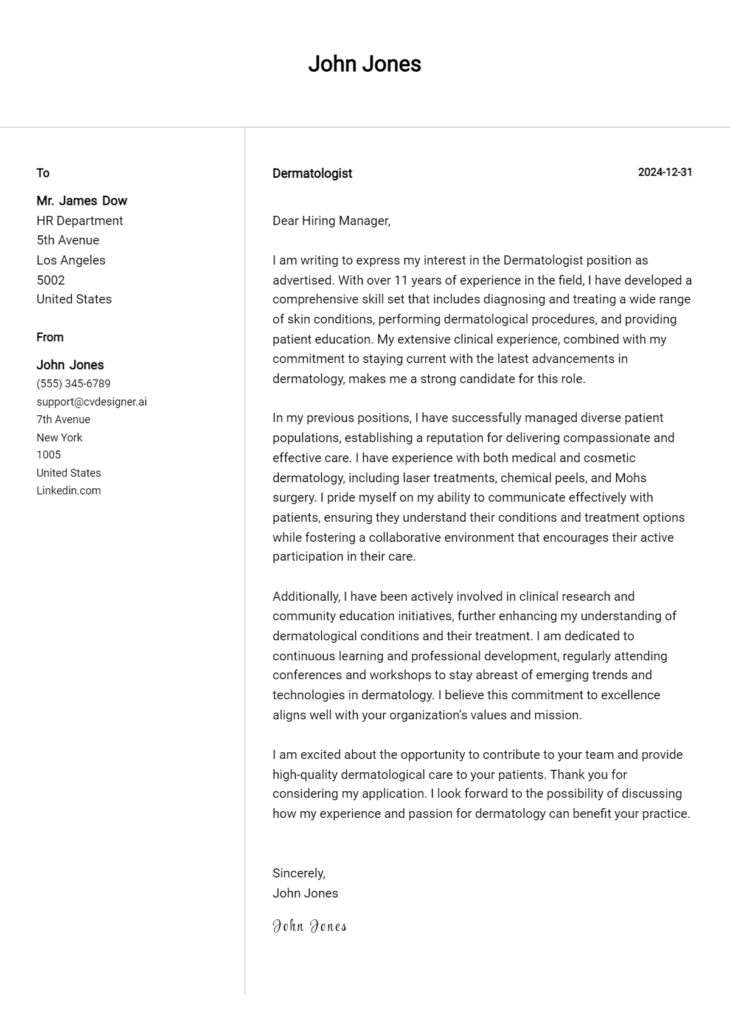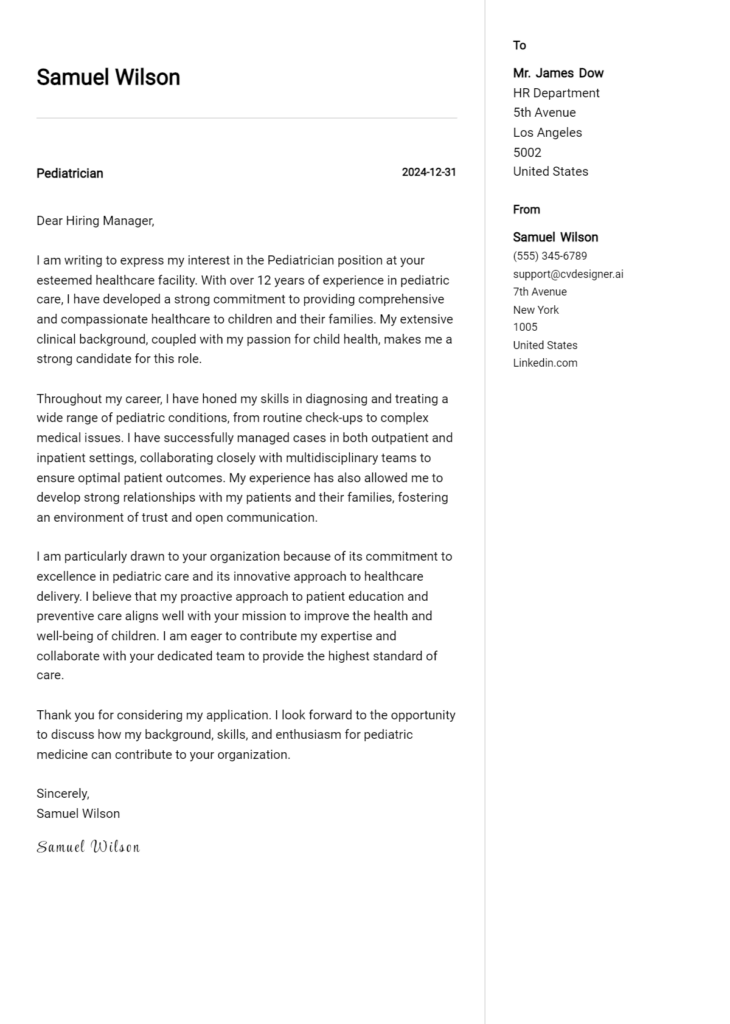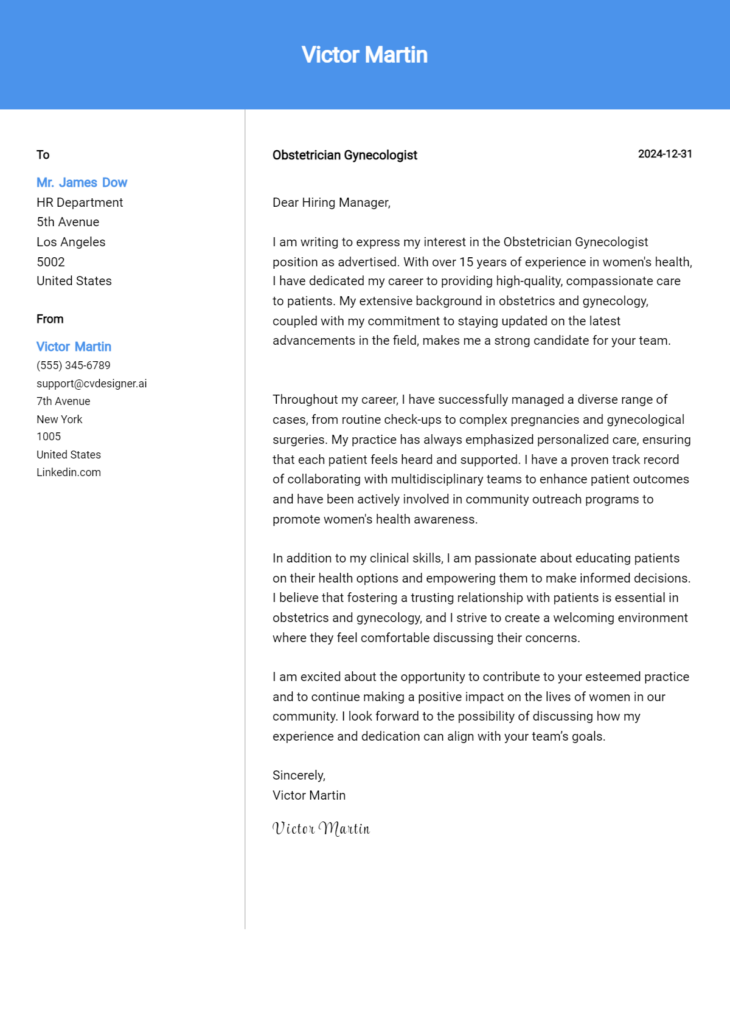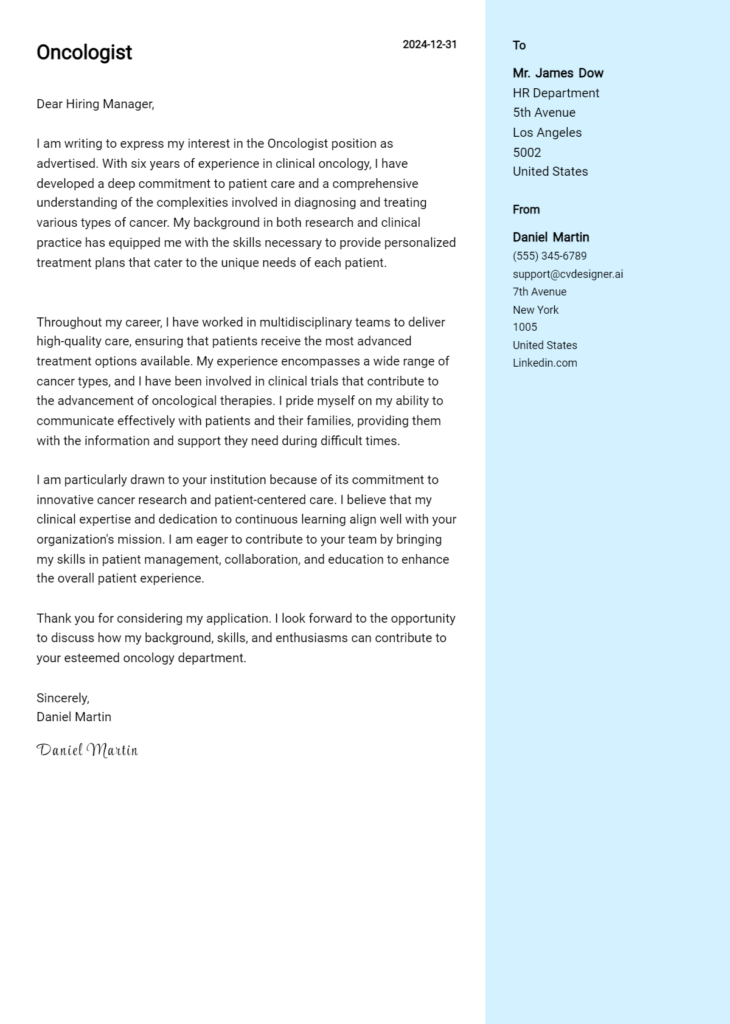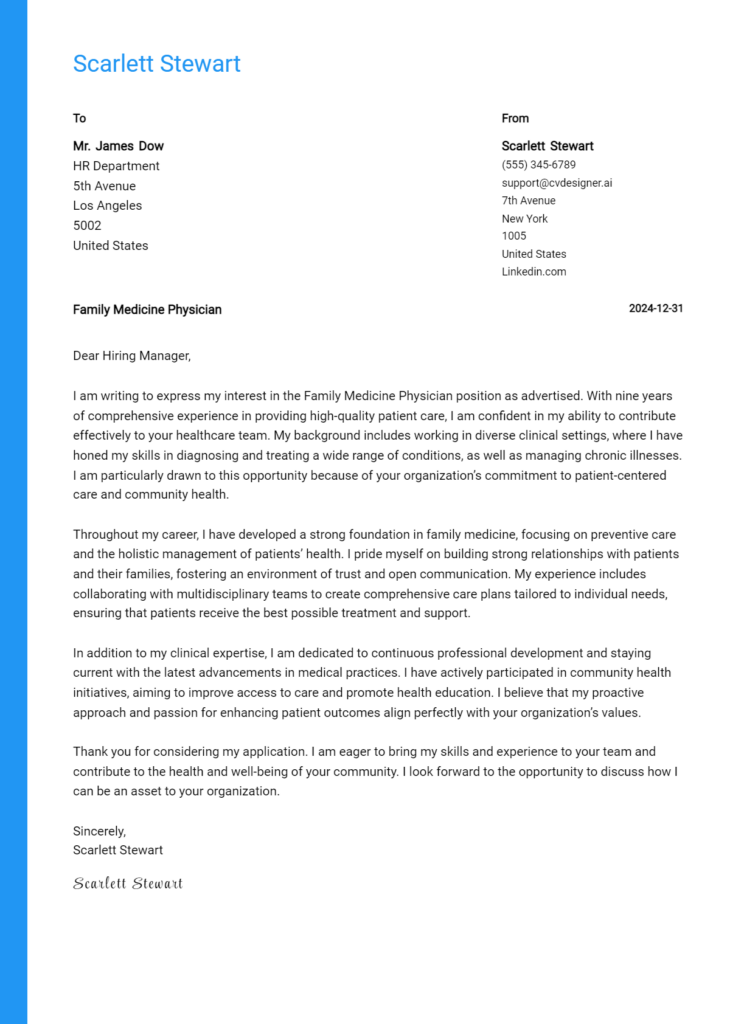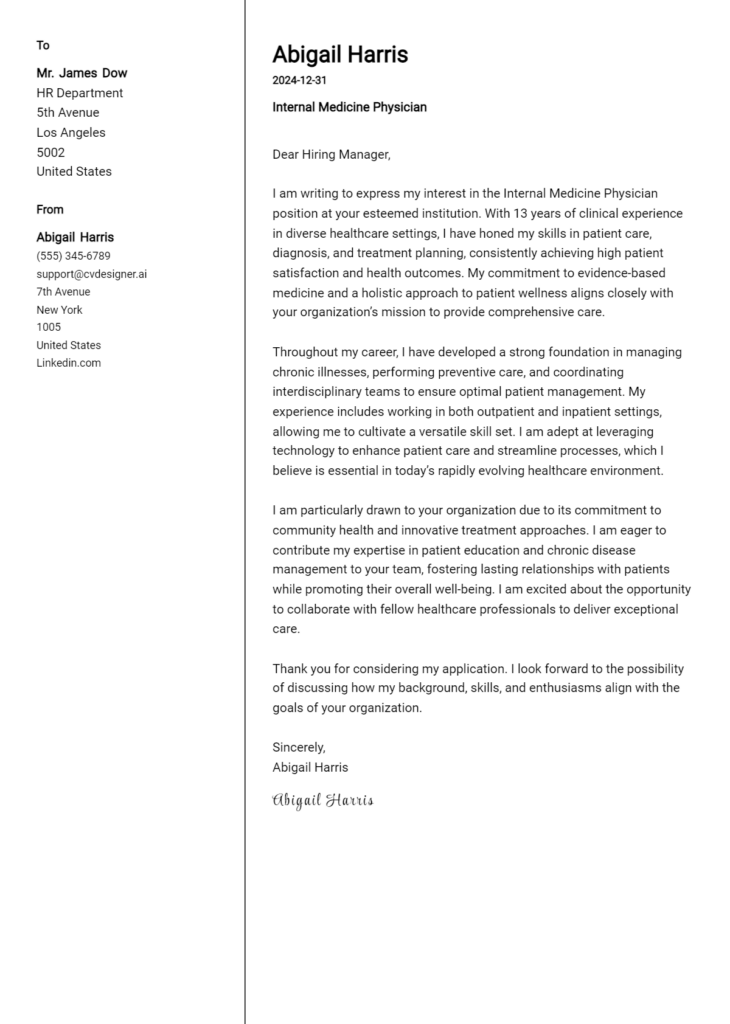Rheumatologist Cover Letter Examples
Explore additional Rheumatologist cover letter samples and guides and see what works for your level of experience or role.
How to Format a Rheumatologist Cover Letter?
Crafting a compelling cover letter is essential for a Rheumatologist, as it not only showcases your medical expertise but also reflects your communication skills and professionalism. The format of your cover letter serves as an important first impression, allowing you to present your qualifications and dedication to patient care clearly and effectively. A well-structured cover letter can help you stand out in a competitive field, emphasizing your ability to connect with patients and collaborate with healthcare teams.
In this guide, we'll explore how to effectively structure your cover letter, providing insights and Rheumatology-specific examples to help you create a persuasive document.
We'll focus on the essential components of a professional cover letter, including:
- Cover Letter Header
- Cover Letter Greeting
- Cover Letter Introduction
- Cover Letter Body
- Cover Letter Closing
Each section is crucial in showcasing your qualifications and commitment to excellence in Rheumatology. Let’s break down each part to help your cover letter leave a lasting impact.
Importance of the Cover Letter Header for a Rheumatologist
A well-organized cover letter header is essential for a Rheumatologist as it sets the tone for professionalism and clarity, making a strong first impression on potential employers. The header should include the applicant's contact information, the date, and the recipient's details, ensuring that all parties can easily communicate. A clear and professional header not only reflects the candidate's attention to detail but also their understanding of medical professionalism, which is crucial in the healthcare field.
Here are examples of a strong and weak cover letter header for a Rheumatologist:
Strong Example
Dr. Jane Smith, MD 123 Health Lane Wellness City, ST 12345 (123) 456-7890 jane.smith@email.com October 10, 2023 Hiring Manager ABC Medical Center 456 Care Ave Healthville, ST 67890
Weak Example
Jane S. Email: jane.smith@email 10/10/23 To Whom It May Concern
The Importance of a Strong Cover Letter Greeting for a Rheumatologist
The greeting of your cover letter is more than just a formality; it sets the tone for the entire letter and serves as a first impression. A well-crafted greeting demonstrates professionalism and shows that you have taken the time to personalize your application by addressing the hiring manager directly. This personal touch can help you stand out in a competitive job market, particularly in specialized fields like rheumatology. To avoid sounding generic, take the time to research the recipient's name and title, ensuring your greeting is both respectful and relevant.
Strong Greeting Example
Dear Dr. Jane Smith,
Weak Greeting Example
To Whom It May Concern,
By opting for a strong greeting, you convey your enthusiasm for the position and respect for the individual reviewing your application. In contrast, a weak greeting can come off as impersonal and may not establish the connection you want with the hiring team.
The Importance of a Well-Crafted Cover Letter Introduction for a Rheumatologist
A well-crafted cover letter introduction is crucial for any candidate, particularly for a specialized role like a Rheumatologist. This opening paragraph serves as the first impression for the hiring manager and should immediately capture their attention. It’s essential to express genuine interest in the position while briefly showcasing key skills, experiences, or achievements that align with the requirements of the role. A compelling introduction can set the tone for the rest of the cover letter, making the candidate stand out among a sea of applicants. Below are examples of strong and weak cover letter introductions for a Rheumatologist.
Strong Example
Dear [Hiring Manager's Name], As a board-certified Rheumatologist with over eight years of experience in diagnosing and treating complex autoimmune diseases, I am excited to apply for the Rheumatologist position at [Institution/Practice Name]. My passion for patient care, combined with my expertise in advanced treatment protocols and my recent research published in the Journal of Rheumatology, uniquely positions me to contribute effectively to your esteemed team. I am eager to bring my skills in collaborative patient management and innovative therapeutic approaches to enhance the quality of care for your patients.
Weak Example
To Whom It May Concern, I am applying for the Rheumatologist job. I have a lot of experience and think I would be good for the position. I am a doctor and have worked in different hospitals. I hope you will consider my application.
Cover Letter Body for a Rheumatologist
The cover letter body for a Rheumatologist serves as a critical platform to demonstrate the candidate's clinical expertise, relevant experiences, and overall value to the potential employer. It allows candidates to highlight specific projects, research, or accomplishments that showcase their competencies in diagnosing and treating rheumatic diseases. By detailing their experiences, such as participating in clinical trials, contributing to patient care improvements, or engaging in community outreach, candidates can effectively communicate their dedication to the field and their potential contributions to the organization. This section should be tailored to align with the values and needs of the employer, thereby reinforcing the candidate's fit for the position.
Strong Example
Dear Hiring Committee, I am excited to apply for the Rheumatologist position at [Company Name]. In my previous role at [Previous Institution], I successfully led a multidisciplinary team in a clinical trial for a novel biologic therapy, which resulted in a 30% improvement in patient outcomes for those with rheumatoid arthritis. My commitment to evidence-based practice is further reflected in my contribution to a published study on the long-term effects of early intervention in lupus patients, which has been cited by peers in the field. I am eager to bring my expertise in patient-centered care and research to [Company Name] and collaborate with your team to improve the quality of life for patients with rheumatic diseases. Sincerely, [Your Name]
Weak Example
Dear Hiring Manager, I want to apply for the Rheumatologist job. I have worked in this field for a few years and have seen many patients. I think I am a good doctor. I sometimes attend conferences and read some articles. I hope to be part of your team. Best, [Your Name]
Importance of the Cover Letter Closing for a Rheumatologist
The closing paragraph of a cover letter is crucial as it summarizes your qualifications, reinforces your enthusiasm for the role, and encourages the hiring manager to take the next steps, such as reviewing your resume or scheduling an interview. A strong closing leaves a lasting impression and highlights your suitability for the position, while a weak closing may fail to convey your eagerness or qualifications effectively.
Strong Example
In conclusion, my extensive training in rheumatology, combined with my commitment to patient-centered care, makes me an ideal candidate for this role. I am excited about the opportunity to contribute to your esteemed practice and to collaborate with a dedicated team. I look forward to the possibility of discussing how my background and skills align with your needs. Thank you for considering my application; I hope to speak with you soon about scheduling an interview.
Weak Example
I think I would be okay for this job. I have done some work in this area before. If you want to talk, that would be fine. Thanks for reading my letter.
Crafting an effective cover letter is essential for Rheumatologists looking to stand out in a competitive job market. A well-written cover letter not only introduces you to potential employers but also highlights your technical skills, problem-solving abilities, knowledge of the Software Development Life Cycle (SDLC), teamwork experience, and passion for continuous learning. These elements are crucial in demonstrating your readiness for the challenges of the role. Below are some tips to help you create a compelling cover letter that showcases your qualifications and enthusiasm.
Tips for Writing a Cover Letter for a Rheumatologist
Highlight Your Technical Skills
Begin your cover letter by clearly stating your relevant technical skills. Discuss your familiarity with various diagnostic tools, treatment plans, and evidence-based practices related to rheumatology. Providing specific examples of how you have successfully applied these skills in past roles can significantly enhance your appeal to potential employers.Demonstrate Problem-Solving Abilities
Employers value candidates who can effectively tackle complex medical issues. Share examples from your experience where you identified and resolved challenging cases. Highlight your analytical skills and how your approach to problem-solving has led to improved patient outcomes, showcasing your ability to think critically under pressure.Showcase Your SDLC Knowledge
If applicable, mention your understanding of the Software Development Life Cycle (SDLC), especially if you have experience using healthcare software or electronic health records (EHR). Explain how your familiarity with these systems can streamline patient care and improve data management, which is increasingly important in today’s healthcare landscape.Emphasize Teamwork Experience
Rheumatology often requires collaboration with multidisciplinary teams. Illustrate your ability to work effectively with other healthcare professionals, such as nurses, physical therapists, and pharmacists. Include specific examples of successful team projects or initiatives where your contributions were vital to achieving shared goals.Express a Passion for Continuous Learning
The field of rheumatology is constantly evolving, and demonstrating a commitment to lifelong learning can set you apart. Mention any relevant certifications, conferences, or continuing education courses you have undertaken. This not only showcases your dedication to professional development but also conveys your eagerness to stay current with advancements in the field.
Incorporating these tips into your cover letter will help you present a well-rounded picture of your qualifications as a Rheumatologist. For additional resources, consider exploring various cover letter templates or utilizing a cover letter builder to streamline your writing process.
Common Mistakes to Avoid in a Rheumatologist Cover Letter
Crafting a compelling cover letter is vital for a successful application as a Rheumatologist. Avoiding common mistakes can significantly enhance your chances of making a positive impression. Here are some frequent pitfalls to watch out for:
Generic Content: Using a one-size-fits-all approach can make your cover letter feel impersonal. Tailor your letter to the specific position and institution to demonstrate your genuine interest.
Lack of Specificity: Failing to highlight your unique qualifications and experiences can weaken your application. Include specific examples of your expertise in rheumatology and patient care.
Ignoring Formatting Guidelines: A poorly formatted cover letter can distract from your message. Familiarize yourself with proper cover letter format to ensure clarity and professionalism.
Typos and Grammatical Errors: Simple mistakes can detract from your professionalism. Proofread your letter multiple times and consider having a colleague review it as well.
Focusing on Salary or Benefits: Mentioning salary expectations or benefits too early can create a negative impression. Instead, concentrate on your skills and how you can contribute to the team.
Neglecting the Introduction: A weak introduction can fail to capture the reader's attention. Start with a strong opening that clearly states your interest in the position and your qualifications.
Overly Lengthy Content: A cover letter should be concise and to the point. Aim for a length of one page and ensure every sentence adds value to your application.
By being mindful of these common mistakes, you can create a more effective cover letter. For inspiration, explore various cover letter examples to see how successful candidates present their qualifications.
Cover Letter FAQs for Rheumatologist
What should I include in my cover letter as a Rheumatologist?
In your cover letter, you should highlight your relevant qualifications, including your medical degree, residency, and fellowship in rheumatology. Emphasize your clinical experience, particularly in diagnosing and treating autoimmune diseases, arthritis, and other rheumatological conditions. Mention any specialized training or certifications, as well as research experience or publications that demonstrate your expertise. Showcase your interpersonal skills, as communication with patients and multidisciplinary teams is crucial. Lastly, express your enthusiasm for the position and the organization, and briefly explain how your background aligns with their goals and values.
How can I make my cover letter stand out?
To make your cover letter stand out, personalize it for each position by addressing the hiring manager by name and referencing the specific institution. Use compelling anecdotes that highlight your clinical experience and success stories, such as innovative treatment plans or patient care outcomes. Incorporate keywords from the job description to align your skills with their needs. Additionally, demonstrate your passion for rheumatology and your commitment to patient-centered care. A well-structured, error-free letter with a professional tone will also contribute to a strong first impression.
Should I include my research experience in my cover letter?
Yes, including your research experience in your cover letter is beneficial, especially if it pertains to rheumatology. Highlighting your research can showcase your analytical skills and your commitment to advancing the field. Discuss any relevant projects, clinical trials, or publications that demonstrate your expertise in specific areas of rheumatology, such as inflammatory diseases or treatment methodologies. If your research has led to significant findings or has been presented at conferences, mention these achievements to illustrate your contributions to the medical community. This can set you apart as a candidate who not only treats patients but also engages in the ongoing development of the specialty.
How long should my cover letter be?
Your cover letter should ideally be one page long, containing three to four concise paragraphs. Aim for around 250-400 words to ensure that you provide enough detail without overwhelming the reader. Use clear and direct language to convey your qualifications and enthusiasm for the role. Each paragraph should serve a specific purpose: an introduction that states the position you’re applying for, a body that outlines your relevant experiences and skills, and a conclusion that reiterates your interest and invites further discussion. Keeping it succinct and focused will help maintain the reader's attention while effectively communicating your candidacy.
Build your Cover Letter in minutes
Use an AI-powered cover letter builder and have your letter done in 5 minutes. Just select your template and our software will guide you through the process.

